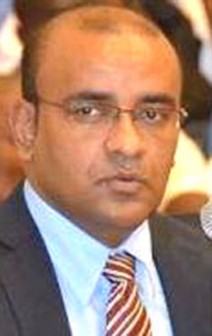The People’s Progressive Party (PPP) says that when former President Bharrat Jagdeo spoke about a “resurgence” of feelings against Indo-Guyanese he was speaking from the premise of “equal opportunity for all.”
Jagdeo’s remarks at the funeral of Pandit Reepu Daman Persaud two Thursdays ago prompted criticism over their appropriateness and veracity.
Adverting to a court case that he had brought against columnist Freddie Kissoon, Jagdeo said “…Recently 38 persons, because their names (are) of East Indian-descent, were used in a case to say that the People’s Progressive Party, because they [are] employed in the public service, is practising discrimination; that we are giving people of Indian-origin preferences. Now, a lot of those people have served either 30 years in the public service, some joined the public service even when we were in the opposition; but the only reason their names were in that list that [Head of the Presidential Secretariat Dr. Roger] Luncheon is very familiar with, because he faced the brunt of it, is because of their origin, their East Indian-origin”.

He added: “What is the message to people of East Indian origin? If you’re PPP or PNC, if you are Christian, Hindu or Muslim, if you’re a sugar worker or a professional, once you’re of Indian origin, you should keep your children home, don’t send them to school. The same colonial message! Because, if, heaven forbids, they become qualified and they get a job and the PPP is in office, then it has not to be because of our merit but rather our race”.
In its statement on Thursday, the PPP noted the attention that Jagdeo’s statement had attracted, including an editorial in the Stabroek News of April 15. The party said that Jagdeo’s remarks were underpinned by the premise of equal opportunity for all.
The party added that Jagdeo had even mentioned that throughout his life in the PPP he had not heard any remarks in the party “premised on capitalizing on race.”
The party said it was surprised that Jagdeo’s remarks in decrying the previous colonial discrimination against Indians and its “seeming re-emergence” should have been so offensive to Stabroek News, which it said has never raised a critical voice against those who try to invent racism on a daily basis. It argued that media entities also never address the situation where political messages are tailored to the geography and ethnic make-up of particular areas by the opposition and in particular the AFC.
The PPP said that as stated by Jagdeo “the whole atmosphere that the opposition media is trying to create is to show that Indians in the public service did not get there by merit, but because the PPP discriminated against others.”
The ruling party accused Stabroek News of perpetuating this in its April 15th editorial when it said: “What Mr Jagdeo wants to cover is the growing questions that have arisen over his decisions to select certain groups to the detriment of others. The decision in the last days of his presidency to hand out licences and frequencies to certain individuals including to the relatives of a minister remains a prime unresolved matter.”
The PPP said that implicit in this statement is that only Indo-Guyanese got radio licences when the reality was that four Indo-Guyanese along with four Afro-Guyanese and one Portuguese were granted radio licences.
The PPP asked what was the motive of only naming Indo-Guyanese who received radio licences adding that “Is this not an attempt, on the part of the Stabroek News and the Kaieteur News to ferment negative feelings against Indo-Guyanese?”
In a comment on the PPP statement, Stabroek News Editor-in-Chief Anand Persaud said there was no attempt in the editorial to foment negative feelings against Indo-Guyanese. He added that if there was any fomenting done it was by Jagdeo. Persaud said it was the newspaper’s considered view that former President Jagdeo had introduced a red herring to deflect attention from controversial awards of frequencies to the relatives of the Minister of Natural Resources and others perceived to be close to him and the government, among other decisions. Persaud said the PPP’s argument that persons of other ethnicities also received licences and frequencies did not detract from the vulgarity of some of the awards.
Persaud said it was surprising that a party which often professes adherence to the tenets of good governance did not address the shadowy nature of the awards of the radio licences just prior to the 2011 general elections and the breach by former President Jagdeo of an agreement not to award licences until a new broadcast authority was in place.
The PPP’s statement came just days after Home Affairs Minister Clement Rohee had told the media at a PPP press conference on April 15 that Jagdeo’s statement at the funeral was made in his capacity as a private citizen.
Responding to a question, Rohee said “The former president was not speaking on a PPP/C political platform… he was speaking at a private function. I am not distancing the PPP from what he said,” while adding that the leadership of the PPP has not met to consider “the merits or demerits of the statement.”





